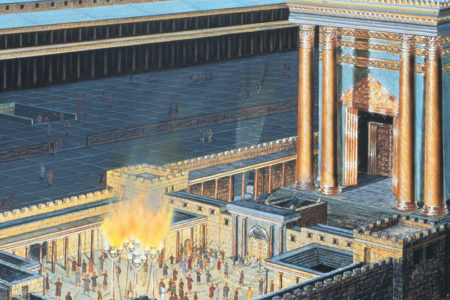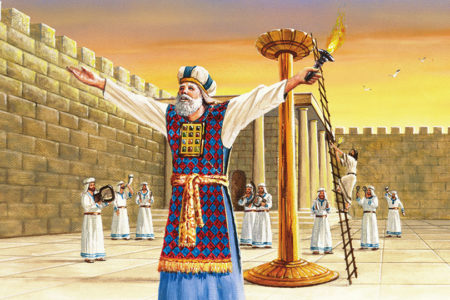God’s Discipline of Israel
Hosea 12:1-14
Two young boys were fighting in the park. A man took one of the boys aside and began to spank him for his inappropriate behavior. An observant bystander indignantly asked the man, “Why are you spanking one boy and not the other?” The man replied, “The one I am spanking is my son, the other is not.” As this story implies, wrong actions demand reprimands. Like the father who disciplined his son for inappropriate behavior, so God chastened Israel.
Ignoring God’s many warnings and past discipline, Israel continued to be a disobedient son. The nation indulged in deceit and lies and expressed its unfaithfulness to Jehovah through social injustice and reliance on political treaties with foreign nations. Such inappropriate behavior required God to discipline Israel further. But before doing so, He graciously extended one more opportunity to turn to Him in repentance.
In chapter 12, Hosea used Jacob to illustrate the type of commitment God desired from Israel. When God chastened Jacob for trickery and deceit, Jacob repented with renewed commitment to the Lord; God wanted Israel to do the same.
Israel’s Diplomacy
Israel’s unfaithfulness and deceptive foreign policy are depicted as the wind. “Ephraim feedeth on wind, and followeth after the east wind; he daily increaseth lies and desolation; and they do make a covenant with the Assyrians, and oil is carried into Egypt” (v. 1). The east wind is called a sirocco. It is an extremely hot wind that blows from the eastern desert, scorching man, animals, and vegetation. No rational person would want to be near such a storm; but Israel “feedeth” (grazed) on the sirocco. Israel was feeding on such practices as idolatry, immorality, and social injustice that did not nourish the nation but “daily” eroded its strength and eventually would destroy it.
Israel was on a dangerous and destructive course. Rather than putting faith in God for help, the northern kingdom of Israel made a political treaty with Assyria, then turned to Egypt for assistance in breaking it (2 Ki. 17:3–4). Israel’s integrity was empty like the wind and brought the scorching blast of Assyria’s anger on the nation. King Hoshea sent a gift of “oil” (olive oil) to Egypt in hope of securing the nation as an ally against Assyria (2 Ki. 17:4).
God widened the charge against Israel to include Judah. “The LORD hath also a controversy with Judah, and will punish Jacob according to his ways; according to his doings will he recompense him” (v. 2). The Lord presents Himself as both plaintiff and judge against all 12 tribes. The reference to Jacob includes the 10 tribes of Israel in the north and the two tribes of Judah in the south. God will chasten both kingdoms for their sin.
Israel’s Discipline
Using illustrations from the life of the patriarch Jacob, the Lord tried to arouse Israel to forsake her sin. First, Jacob “took his brother by the heel in the womb, and by his strength he had power with God” (v. 3). Before Jacob was born, his hand grasped Esau’s heel (Jacob means “heel-gripper”). This action was prophetic, displaying Jacob’s zeal and appreciation for spiritual matters. Years later, through trickery, Jacob gained the birthright and blessing of the firstborn from Esau, who afterward called him a supplanter (Gen. 27:36). Israel was supposed to exhibit a zeal for spiritual things, as did her forefather Jacob.
Second, on his return to Canaan after 20 years in Paddan-aram, Jacob wrestled with an angel (the preincarnate Christ) at Peniel until the break of day. Hosea said, “And by his strength he had power with God. Yea, he had power over the angel, and prevailed; he wept, and made supplication unto him” (vv. 3–4). The angel was trying to make Jacob submit to God’s will. When the angel could not prevail, he touched the hollow of Jacob’s thigh, putting it out of joint. However, Jacob would not release his grip until the Lord blessed him. Through this crisis experience, Jacob learned to cling to God, not to his own cunning devices, wisdom, experience, trickery, or strength.
Hosea also mentioned Jacob’s experience with God at Bethel: “He found him in Bethel, and there he spoke with us” (v. 4). This is the second time God revealed Himself to Jacob at Bethel. (The first time was when Jacob fled home in fear of Esau [Gen. 28:10–22].) At this appearance (Gen. 35:9–15), God blessed Jacob with a new name and power. He named him Israel, meaning, “God strives,” or “he who strives with God” (cf. Gen. 32:24–31). Thereafter, spiritual victories came to Israel through God’s divine power and blessing; and God fought the nation’s battles. The Lord also confirmed the promises He made to Jacob’s grandfather, Abraham, and his father, Isaac. Years later these promises were confirmed to the sons of Jacob.
Hosea made it clear that the one who spoke to Jacob was none other than “the LORD God of hosts; the LORD is his memorial” (v. 5). He is Jehovah, the covenant-keeping, unchangeable, self-existent one who commands the armies of heaven, both visible and invisible, and rules with unrestricted omnipotence on Earth as in heaven. This is the name God gave Himself when He called Moses to serve Him (Ex. 3:13–15). God was able to deliver the Israelites of Hosea’s day as He did their forefathers if only they turned to Him in repentance.
Genuine repentance required changing their conduct toward man and God. First, they needed to “keep mercy (meaning love) and justice” (v. 6) to their neighbors. Second, they needed to “wait on . . . God continually” (v. 6), that meant, allowing God to act in their behalf rather than making decisions laced with deceit and lying schemes. What God required of Israel was obedience to the whole Law. He wanted the Israelites to show mercy and justice to their fellowmen as dictated in the last five of the Ten Commandments. Such action would have displayed visible and sincere repentance before the Lord. Israel needed to abandon her deception and lying, as did Jacob, and come to God in repentance.
Israel’s Deception
Israel had assimilated the practices of the Canaanites, her pagan neighbors:
He is a merchant, the balances of deceit are in his hand; he loveth to oppress. And Ephraim said, Yet I am become rich, I have found substance; in all my labors they shall find no iniquity in me that is sin (vv. 7–8).
The Canaanites originally were Phoenician traders whose reputation for fraudulent transactions was well known. Israel, like the Canaanites, became wealthy by cheating people with deceptive scales—a practice prohibited by law (Dt. 25:13). The Israelites took great pride in their craftiness and boasted of their wealth. They were self-deceived and believed God would not hold them accountable for their thievery; it was simply business as usual.
God was not ignorant of Israel’s fraudulent transactions and did not plan to allow the nation to go unjudged. He said, “And I that am the LORD, thy God, from the land of Egypt, will yet make thee to dwell in tabernacles, as in the days of the solemn feast” (v. 9). The Lord reminded Israel that He was her God since the day He delivered the nation from bondage in Egypt. He had delivered, protected, prospered, and settled the Israelites in a land they had not labored to acquire. But God would humble them by destroying their cities. He would drive them from their comfortable homes, luxurious dwellings, profitable businesses, and cultivated fields to become a nomadic people. Furthermore, they would live in tents, as they did during their wilderness wanderings and the Feast of Tabernacles (Lev. 23:34–43).
God had warned Israel by direct instruction through prophets, visions, and parables (v. 10); yet Israel turned a deaf ear to the prophets’ messages.
Mockingly, God asked, “Is there iniquity in Gilead? Surely they are vanity; they sacrifice bullocks in Gilgal; yea, their altars are like heaps in the furrows of the fields” (v. 11). Gilead and Gilgal are mentioned to show how widespread Israel’s iniquity had become, reinforcing the theme of the nation’s lying and deceit in both religion and politics. Gilead was on the east side of the Jordan River, an area totally given to idolatry, sexual immorality, and wickedness of every sort. It was a rendezvous for bands of marauders who waited in ambush to rob, rape, and murder those who traveled through the mountainous area (cf. Hos. 6:8–9).
Gilgal was on the west side of the Jordan where Israel “sacrificed bullocks” to calf worship and Baal. Here altars were as numerous and worthless as a heap of stones that a farmer stacks up at the side of his furrowed field. What took place in Gilead and Gilgal was true of the whole nation of Israel. There is a play on words here: Gilead and Gilgal would become gallim—Hebrew for “a heap of stones.” God answered His own question: “Surely they are vanity [worthless]” (v. 11).
Hosea returned to Jacob’s humble beginning to remind the proud nation of how God cared for it:
And Jacob fled into the field of Aram [Paddan-aram], and Israel served for a wife, and for a wife he kept sheep. And by a prophet the LORD brought Israel out of Egypt, and by a prophet was he preserved (vv. 12–13).
After Jacob fled to Paddanaram, he tended Laban’s flock for 14 years to compensate Laban for marrying his daughter Rachel (Gen. 29:20, 27). Like a shepherd, the Lord loved and cared for Israel.
Many years later, Jacob and his family went down to Egypt, where the Israelites grew into a multitude and became slaves to Pharaoh. God cared for them then too. He raised up the prophet Moses to deliver them from slavery and cared for them as they wandered 40 years in the wilderness. The word preserved (v. 13) means to “keep sheep.” Jacob kept sheep; and, in like manner, God kept Israel like a fold of sheep. As God had brought Jacob back from Paddan-aram, so, too, He brought Israel back into the Promised Land.
The chapter closes with these words: “Ephraim provoked him to anger most bitterly; therefore shall he leave his blood upon him, and his reproach shall his Lord return unto him” (v. 14). Although God loved and cared for Israel, the nation’s gross immorality, idolatry, and indifference to God’s goodness angered Him bitterly. Israel required chastening for her sin. God did not remove the nation’s guilt or penalty for shedding innocent blood, especially regarding her practice of sacrificing her children to the heathen god Molech (2 Ki. 17:17–18). This vile ritual insulted God, Israel’s true Lord (Master), and intensified Israel’s guilt and penalty. This explains the severity and length of Israel’s chastisement, which has yet to come to an end.
God’s love for Israel has not changed. As He loved Jacob, so He will love Israel when her greatest hour of trial arrives in the future. Then Israel will embrace the Lord as Savior, and He will bestow Kingdom blessings on the nation.








Brother Levy,
I was searching for discussion on whether Israel ever lived obedient to God and for how long. I know there were brief times and it seemed they lasted a generation only. I found your article pop up on my search and although it did not answer my particular question, I did notice you mentioned the struggle between the angel and Jacob.
That brought up another question I have had and I cannot find anyone who will discuss it with me. Why didn’t the angel (if indeed he was the preincarnate Jesus) defeat Jacob easily? I ask because there is another scripture in Daniel 10 when Daniel is praying for 21 days and finally he gets an answer from “a certain man dressed in linen, whose loins were girded with a belt of pure fine gold of Uphaz” who explained to Daniel he had been battling
(or standing against) “the prince of the kingdom of Persia” for twenty-one days then Michael came to help. I have heard the “Certain Man” might be the preincarnate Jesus and I want to believe that is true. The description of Him and when He spoke to Daniel, all of it led me to believe He was Jesus. Other people say no. Their reason is that if it had been Jesus, He would have defeated the demonic angel quickly. But then I think of Jacob and the angel struggling against each other (most think this is Jesus).
I’m not done yet!
I move into the New Testament and when Jesus gave up His Spirit on the cross, He proclaimed “It is finished!”. I believe He is saying Satan is defeated once and for all. When our sin was nailed to the cross, Satan lost!
So, I ask you if I am wrong in thinking Jesus (preincarnate) battled with demonic powers. I might be making this too simplistic, it’s my lack of good education and a weaker mind than many. But I have been rebuked by other believers for even discussing this matter. I have read your articles and I would trust your remarks.
Thank you,
a sister in Christ, Pat H.